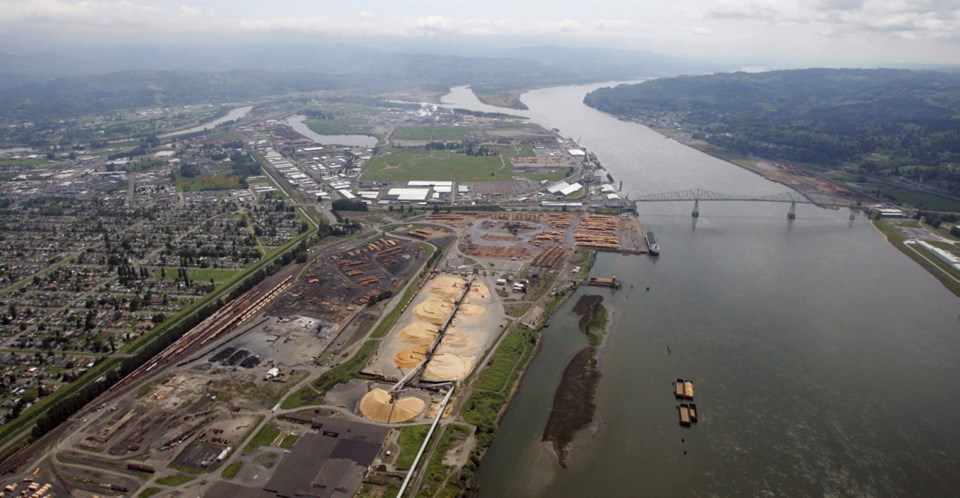American coal producers recently challenged governments in Washington state and California for blocking projects to build coal-shipping ports. The projects at Oakland, California, and Longview, Washington, are the last of seven such proposals for the U.S. Pacific coast.
The other five projects were cancelled because of Asia’s volatile demand for coal and fierce opposition from local communities. Although one project — a large-scale coal terminal near Bellingham — was halted to protect Lummi First Nation §shing rights, environmental concerns featured prominently in all cases.
In Oakland’s case, a U.S. Centers for Disease Control study was cited that showed excessive exposure to coal dust can cause black lung and other respiratory problems. The study concluded that dust emissions from coal transport would threaten local health. However, coal producers Cloud Peak, of Wyoming, and Bowie Resources, of Utah, argue that the study examined a different kind of coal and ignored technologies that control coal dust.
Meanwhile, as the second of two legal challenges was filed in the U.S. in mid-January, a Canadian federal court struck down a legal challenge here in B.C. The challenge was against Fraser Surrey Docks, which had received approval from the Port of Vancouver to build a direct-transfer coal facility on the Fraser River. If built, the facility would be used to transfer up to eight million tonnes of coal annually from trains onto barges, which would move the coal to a deep-water station on Texada Island. From there, the fuel would be loaded onto Asia-bound freighters.
The B.C. lawsuit was filed in 2014, but the battle against the facility had begun long before. Surrey, New Westminster and Burnaby refused to support the project. The chief medical health officers from Fraser Health and Vancouver Coastal Health at the time called for a broad-based health-impact assessment, arguing that the health assessment done by the port authority was inadequate.
Scientists know coal dust harms marine animals, from filter-feeding bivalves and fish to everything that eats them. They know repeated high-level exposure to the dust causes illness.
But not much is known about the impacts of coal trains as they pass through populated areas.
The most relevant research available is a 1998 study that concluded local residents likely faced few health risks because of operations at the Westshore coal terminal at Tsawwassen’s Roberts Bank. Mind you, in 1998, the port shipped less coal, fewer trains carried coal through Delta and fewer people lived in Delta.
The port has installed sprayer systems to control coal dust, but they don’t stop all of it. Delta-area residents and businesses still report black speckles on buildings, vehicles and gardens.
The Roberts Bank Westshore terminal — its coal mounds visible from ferries pulling in and out of Tsawwassen — is North America’s busiest coal-export terminal. With U.S. port capacity for moving coal to Asia limited, Cloud Peak, Bowie Resources and Lighthouse Resources Inc. have been shipping their coal by rail up to B.C. to the terminal.
Those trains pass through the same Oregon and Washington communities that blocked coal-export facilities in part because of concerns over dust blowing off coal trains.
If the Fraser Surrey Docks project is built, much of the coal shipped through it would come from the same American sources.
Unlike coal mined in eastern B.C., almost no B.C. carbon tax is levied on U.S. coal shipped those few kilometres from the U.S. border by White Rock to Lower Mainland ports. Unlike B.C. coal sent to Asia, which is higher-grade coal used for making steel, the U.S. coal is used to generate electricity in Asia. Thermal, or fuel, coal is the main cause of China’s appalling air quality and an estimated one million deaths in China due to air pollution each year.
China’s air quality is so bad, the country is fast-tracking low-emission alternatives. Although China still needs coal for fuel, its demand is shrinking. For that matter, even coal-friendly Alberta is phasing out coal-fired energy, as are many U.S. states.
With coal power in the world’s emissions and air-quality bad books, the Port of Vancouver and its lease holders at Fraser Surrey Docks and Westshore among the few ports on the coast still investing in large-scale infrastructure to ship thermal coal.



